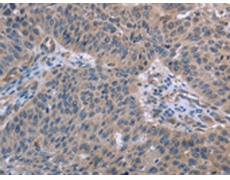中文名稱:兔抗RNF144B多克隆抗體
英文名稱: Anti-RNF144B rabbit polyclonal antibody
別 名: PIR2; IBRDC2; p53RFP; bA528A10.3
相關類別: 一抗
抗 原: RNF144B
儲 存: 冷凍(-20℃)
宿 主: Rabbit
反應種屬: Human, Mouse
標記物: Unconjugate
克隆類型: rabbit polyclonal
技術規格
|
Background: |
p53 is the most commonly mutated gene in human cancer identified to date. Expression of p53 leads to inhibition of cell growth by preventing progression of cells from G1 to S phase of the cell cycle. Most importantly, p53 functions to cause arrest of cells in the G1 phase of the cell cycle following any exposure of cells to DNA-damaging agents. The MDM2 (murine double minute-2) protein was initially identified as an oncogene in a murine transformation system. MDM2 functions to bind p53 and block p53-mediated transactivation of cotransfected reporter constructs. The MDM2 gene is amplified in a high percentage of human sarcomas that retain wildtype p53 and tumor cells that overexpress MDM2 can tolerate high levels of p53 expression. Another p53 target protein is the p53-inducible RING finger protein (p53RFP), an auto-ubiquitinylated protein acting as an E3 ubiquitin ligase. p53RFP, also designated IBRDC2 in mouse and rat, receives ubiquitin from specific E2 ubiquitin-conjugating enzymes and transfers it to substrates that promote their degradation by the proteasome. p53RFP may mediate re-entry into the cell cycle. |
|
Applications: |
ELISA, WB, IHC |
|
Name of antibody: |
RNF144B |
|
Immunogen: |
Fusion protein of human RNF144B |
|
Full name: |
ring finger protein 144B |
|
Synonyms: |
PIR2; IBRDC2; p53RFP; bA528A10.3 |
|
SwissProt: |
Q7Z419 |
|
ELISA Recommended dilution: |
2000-5000 |
|
IHC positive control: |
Human lung cancer and Human cervical cancer |
|
IHC Recommend dilution: |
50-200 |
|
WB Predicted band size: |
34 kDa |
|
WB Positive control: |
TM4 cells |
|
WB Recommended dilution: |
200-1000 |


 購物車
購物車 幫助
幫助
 021-54845833/15800441009
021-54845833/15800441009
